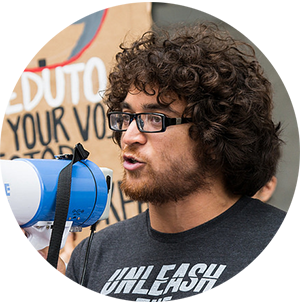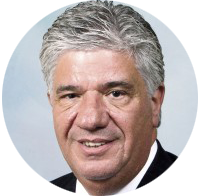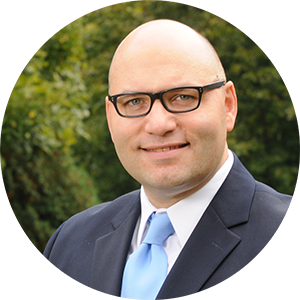Where do the midterm elections candidates stand on the Pittsburgh region’s major environmental issues?
Oct. 31, 2018

Where do the candidates on the midterm elections ballot stand on the Pittsburgh region’s biggest environmental issues?
PublicSource and The Allegheny Front sent out six questions to each candidate that will appear on the Allegheny County ballots on Nov. 6. The questions posed are intended to provide voters with an understanding of the candidates’ positions on climate change, the Shell ethane cracker plant in Beaver County; air quality and the rollback of environmental regulations.
We received 19 responses, some of which were a few sentences long and others surpassing the 250-word limit we gave for each question. We edited the responses for brevity and clarity.
We received only one response from a major party candidate in the highest profile races for United States Senate, governor and lieutenant governor. Eleven of the Democratic candidates running for the state house and senate responded, as did all of the Green and Libertarian Party candidates. Here is a map of the Pennsylvania House of Representatives districts in Allegheny County and here is a map of Pennsylvania Senate districts in the county.
We emailed the questions to the candidates on Sept. 20 and gave the candidates four weeks to respond. We followed up twice as the due date approached. We also called candidates or left messages with phone numbers provided by the League of Women’s Voters.
Question 1 — CLIMATE CHANGE
Do you accept the scientific consensus that human-made emissions are driving climate change? Why or why not? If yes, are we doing enough to address it?
Race: U.S. Senate

Bob Casey, Jr., Democrat
Climate change remains one of the most pressing environmental and moral challenges of our age. In light of the United Nations’ recent climate report, continuing to fight for initiatives to combat climate change is imperative, not just at the federal level, but also at the state and local levels, where continued action will be critical given the current Trump administration. Similarly, it will be crucial to continue to push to maintain the consensus view that climate change is real and to expose anti-scientific efforts to delegitimize climate science.

Dale Kerns, Jr., Libertarian
I do accept the scientific consensus that human-made emissions are driving climate change because this is supported by almost all of the evidence. There can always be innovations and improvements made as a society so that we can do more to address climate change, but I think decision-makers in the private sector have taken significant action in recent years to adapt our economy into one which is more eco-friendly.
Candidates in the race above who did not respond:
Lou Barletta, Republican
Choose below to see answers to this
question from candidates in other Allegheny County races:
Race: Governor

Paul Glover, Green
Humans have become the most powerful influence on climate change due to increased mining, drilling, transport and destruction of habitat for cropland. Climate change will not be reversed by public policy alone but by massive shifts in economy, culture and infrastructure such that civilization balances with nature. I’ve started more than a dozen organizations and campaigns dedicated to this process, written six books explaining how and taught these themes at two universities.
The complete rebuilding of our cities and farms during the next 100 years, toward balance with nature, should be Pennsylvania’s foremost definition of progress and will be the top priority of my administration. Green building and energy efficiency are the essential foundations of a healthy economy. We can gradually cut reliance on fossil fuels by 80 percent. Cities, schools, farms and suburbs should receive incentives for passive solar construction and retrofit, attached greenhouses and atria, heat grabbers, sun tubes, etc. Funding will be sparked by regional stock exchanges dedicated to eco-development. Current dependence on centralized utilities drag us into the past, financially and environmentally. While we focus on efficient retrofits, steam cogeneration should get sharp fuel rate discounts. Geothermal and wind should be welcomed into the smart grid as well.
Further, I would shift the state’s budget from road building to rail and transit. The era of the automobile, whether gasoline or electric, must gracefully fade as we build for proximity rather than speed. A penny-per-gallon gas tax for transit paves this route.

Kenneth Krawchuk, Libertarian
Climate change is not a state issue; it’s a planetary thing and, therefore, under federal and international guidance. There’s not much any governor could do. Regardless, my degree is in physics, so I have a reasonable background to understand the arguments on both sides. When I was in college, the prevailing scientific opinion was that we’re entering a new Ice Age. Today it’s the opposite, even though no appreciable warming has occurred since 1998. To sum up, I believe the science is not yet settled.
Candidates in the race above who did not respond:
Tom Wolf, Democrat
Scott Wagner, Republican
Race: Lieutenant Governor

Jocolyn Bowser-Bostick, Green
There have been many hundreds of credible scientific studies that have given evidence to show global warming is real, has accelerated over the past decades and has already caused multiple observed changes in many ecosystems. For over 100 years, scientists have been keeping global temperature records and 17 of the 18 warmest years have occurred since 2001.
We are not doing enough to slow down or eliminate the human actions driving climate change.

Kathleen Smith, Libertarian
I accept that the climate is changing, with both rising temperatures and CO2 levels. I retain some skepticism about the speed of change and, most of all, about how to address it. My largest concern is the way that advocacy groups and world governments are confronting it. The Paris Accord defined specific goals that can only be reached at great expense. And, because pollution tends to be worst in underdeveloped countries, they will bear much of the burden or simply not make the needed changes.
Even if the world met the goals of the accord, its effect will be minimal. But the consequences of spending $1-$2 trillion a year to do it will mean that other reachable goals, like eliminating tuberculosis, educating all women around the world to at least a fourth-grade level and raising the incomes of the world’s poorest people, will not be met.
The best investments to address global warming will be in basic research to find more efficient and lower-cost sources of green energy.
Candidates in the race above who did not respond:
John Fetterman, Democrat
Jeff Bartos, Republican
Race: State Senator, 38th
Candidates in the race above who did not respond:
Jeremy Shaffer, Republican
Race: State Representative, 23rd

Dan Frankel, Democrat
It would be the height of arrogance to believe that I have greater access to the truth about global climate change than the brilliant men and women who dedicate their lives to studying the subject. We've been told some of the steps we need to take to try to slow down what could be irreversible damage with devastating impacts. We must put concentrated focus on reducing carbon and methane emissions, including reliance on fossil fuels and limiting methane leaks.

Jay Ting Walker, Green
We're seeing the effects of climate change right before our eyes with rising global temperatures, warming oceans, shrinking polar ice, rising seas and increased extreme weather events. We see the effects here in Pittsburgh with frequent intense rains leading to flooding all across the county. I do not believe we as a state are doing enough to address it. We have some plans in place but the plans are not aggressive enough. We need to move our state away from fossil fuels rather than deepening our investment in them by creating a regional petrochemical industry as we are now.
Race: State Representative, 28th
Candidates in the race above who did not respond:
Mike Turzai, Republican
Race: State Representative, 30th
Candidates in the race above who did not respond:
Lori Mizgorski, Republican
Race: State Representative, 40th
Candidates in the race above who did not respond:
Natalie Mihalek, Republican
Race: State Representative, 44th
Candidates in the race above who did not respond:
Valerie Gaydos, Republican
Race: State Representative, 54th
Candidates in the race above who did not respond:
Bob Brooks, Republican
Question 2 — Shell ethane cracker
What do you think will be more important for the long-term health of the region: The jobs that will come from the Shell ethane cracker plant? Or the air and water pollution stemming from its operations? Why?
Race: Governor

Paul Glover, Green
There need be no conflict between jobs and environment. As candidate for governor, I’ve drafted an extensive proposal for creating 500,000 green jobs without raising taxes. New ways to feed, fuel, house, heal and employ Pennsylvanians are being explored.
Economic expansion that damages the health of humans, animals, plants, soil, water and air is not progress but decay. Real economic development celebrates and rewards the contributions to a healthy economy made by environmentalists and green energy businesses.

Kenneth Krawchuk, Libertarian
Under the policies of the two old parties the right to pollute can be bought and sold.
I oppose that sort of Shell game (pardon the pun). The best way to protect the environment is to treat pollution as a trespass. So if somebody’s junk is blowing, leaking, shining or whatever onto your property, the simple solution starts with telling them to stop trespassing and get their junk off your property. If they don’t, all existing remedies for trespassing would apply, such as police assistance, court injunctions and court orders to have them remove their mess.
This would work for landfills, frackers, acid rain, loud stereos, bright lights, simple trash and more. As governor, I’ll draw a clean line in the sand by treating pollution as trespass. In this manner, Pennsylvania can have the best of both worlds: hundreds of new jobs and a cleaner environment.
Candidates in the race above who did not respond:
Tom Wolf, Democrat
Scott Wagner, Republican
Choose below to see answers to this
question from candidates in other Allegheny County races:
Race: U.S. Senate

Bob Casey, Jr., Democrat
We can create jobs and protect an environment for all Pennsylvanians. I advocated for bringing the Shell cracker plant to Pennsylvania and believe the jobs it will bring to the region will help Pennsylvania families. I will do whatever I can to keep Pennsylvania competitive.

Dale Kerns, Jr., Libertarian
It is an extremely delicate balance between jobs and the environment. As a U.S. senator, I would not want to rule via legislative fiat how the private sector should strike that balance. While Washington is often well-intentioned in preserving the environment, it does not receive the same market signals that private companies do. Rather than government needlessly intervening, corporations, workers and consumers will ultimately come up with the best solutions.
Candidates in the race above who did not respond:
Lou Barletta, Republican
Race: Lieutenant Governor

Jocolyn Bowser-Bostick, Green
The Shell ethane cracker plant should not be built in Potter Township or anywhere else because it is supporting the continued and expanded extraction of natural gas and natural gas products via the environmentally damaging process of fracking. The short-term and long-term jobs that will be created are not an acceptable trade-off vs. the millions of people whose health will be ruined and life spans shortened because of the millions of tons of pollutants that will be created by this plant.

Kathleen Smith, Libertarian
As someone whose family has lived here for generations, the improvement in the areas’ air and water has been astonishing and something that I would hate to see in danger. For the region, the Shell plant has the ability to provide a much-needed economic benefit. The jobs at the plant itself will be supplemented by associated industrial and transportation jobs and eventually with service jobs in food and retail. Job security does have positive effects on physical and mental health. And, of course, that benefit is stronger if the employers provide health insurance, as most major companies do.
For its nearest neighbors, the noise, traffic and the possibility of pollution are serious concerns. I believe that companies building cracker plants today are more aware of their environmental responsibilities and understand that they will be under more scrutiny than in the past. That said, oversight from all levels of government should begin in the construction stages and follow through the life of the plant. Ideally, communication with the existing community will be strong enough and clear enough to ease concerns from the beginning. But, if not, I’m sure that local environmental groups will apply appropriate pressure on the company and their regulators.
Candidates in the race above who did not respond:
John Fetterman, Democrat
Jeff Bartos, Republican
Race: State Senator, 38th
Candidates in the race above who did not respond:
Jeremy Shaffer, Republican
Race: State Representative, 23rd

Dan Frankel, Democrat
The blue-green alliance between unions and environmental groups shows us that jobs and environmental health don't have to be pitted against each other. Jobs that come from work in any industry that will have an environmental impact should be coupled with jobs from regulators, ensuring that work is done in a responsible sustainable manner with protection of human health at the center.

Jay Ting Walker, Green
The air and water pollution stemming from the Shell ethane cracker plant, the subsequent plants that will come and the intensified fracking that occurs will cause long-term damage to the health of our region. This damage far outweighs the benefits of a few hundred permanent jobs from the Shell ethane cracker plant. The climate change impacts alone make the plant not worth its construction. Instead of providing massive subsidies to the fossil fuel industry, we should be providing those subsidies for wind, solar and green retrofitting.
Race: State Representative, 28th
Candidates in the race above who did not respond:
Mike Turzai, Republican
Race: State Representative, 30th
Candidates in the race above who did not respond:
Lori Mizgorski, Republican
Race: State Representative, 40th
Candidates in the race above who did not respond:
Natalie Mihalek, Republican
Race: State Representative, 44th
Candidates in the race above who did not respond:
Valerie Gaydos, Republican
Race: State Representative, 46th
Candidates in the race above who did not respond:
Jason Ortitay, Republican
Race: State Representative, 54th
Candidates in the race above who did not respond:
Bob Brooks, Republican
Question 3 — Air quality
What do you think should be done to improve the air quality in Western Pennsylvania? Should we be doing anything more to reduce air pollution from large industrial sources? Why or why not?
Race: Lieutenant Governor

Jocolyn Bowser-Bostick, Green
The Clairton Coke Works should be closed because it is one of the top 10 polluters in the region and it was recently assessed what many consider as a long overdue fine of a $1 million for violating air quality standards. People are suffering with respiratory ailments such as asthma, various cancers and other health problems because of all the pollutants being dumped into the air and water from industrial sources. These industries must be forced to drastically clean up their operations or close if they cannot.

Kathleen Smith, Libertarian
It is easy to say, “It’s worth any cost to save one life.” But in reality, money is not infinite and jobs strengthen communities. We accept that there is risk in many aspects of life, and the focus should be to identify the most serious remaining threats that affect the greatest number of people, identify the cost of remission and proceed in a balanced way.
Candidates in the race above who did not respond:
John Fetterman, Democrat
Jeff Bartos, Republican
Choose below to see answers to this
question from candidates in other Allegheny County races:
Race: Governor

Paul Glover, Green
Summarily shut down any severe pollution point sources that cannot be promptly remedied. Replace these with green jobs, which clean water and air. I favor a range of economic development tools that expedite this process.

Kenneth Krawchuk, Libertarian
As an asthma sufferer myself, I can appreciate the necessity. Pardon me for repeating myself, but the best way to protect the environment is to treat pollution as a trespass.
Candidates in the race above who did not respond:
Tom Wolf, Democrat
Scott Wagner, Republican
Race: U.S. Senate

Bob Casey, Jr., Democrat
I have supported federal legislation to curb emissions from a variety of sources and support taking steps to ensure that people are protected from harmful chemicals, while protecting jobs and encouraging new clean technologies.

Dale Kerns, Jr., Libertarian
If companies willingly or negligently pollute, they should certainly be held accountable in the court system, as this is a property trespass. Government prior restraints, while well-intentioned, too often favor the biggest companies over small businesses. Rather than the current bureaucracy, which grants allowances to corporations that can afford them, a property-based system without EPA red tape would even the playing field between different sized companies and prevent further pollution.
Candidates in the race above who did not respond:
Lou Barletta, Republican
Race: State Senator, 38th
Candidates in the race above who did not respond:
Jeremy Shaffer, Republican
Race: State Representative, 16th
Race: State Representative, 23rd

Dan Frankel, Democrat
Allegheny County fined Clairton Coke Works $1 million this summer for the company’s chronic air pollution, and that was a good first step in making it clear that we expect industry to take health effects seriously. We should be enforcing existing laws vigorously. Certainly, as individuals, we need to protect lungs from the air pollution of tobacco smoke. We need to limit outdoor burning. But taking individual actions to reduce particulate matter seems hollow if we don't require large companies to also limit pollution. That's not just Clairton Coke Works, but also drilling companies that are having a negative impact on the air quality in rural Pennsylvania.

Jay Ting Walker, Green
We need to shut down the Clairton Coke Works and other local point-source polluters while working to make sure that those who were working there are smoothly transitioned to other work. This is happening in New York State with the Tonawanda Coke Facility. Our local point-source polluters violate air regulations regularly with the Clairton Coke Works being an extra flagrant violator. Pennsylvania also needs to pass stricter regulation giving the county health department the tools to crack down on emissions. The health costs being paid by so many in our county are not worth the economic benefits for a few.
Race: State Representative, 28th
Candidates in the race above who did not respond:
Mike Turzai, Republican
Race: State Representative, 30th
Candidates in the race above who did not respond:
Lori Mizgorski, Republican
Race: State Representative, 40th
Candidates in the race above who did not respond:
Natalie Mihalek, Republican
Race: State Representative, 44th
Candidates in the race above who did not respond:
Valerie Gaydos, Republican
Race: State Representative, 46th
Candidates in the race above who did not respond:
Jason Ortitay, Republican
Race: State Representative, 54th
Candidates in the race above who did not respond:
Bob Brooks, Republican
Question 4 — Environmental regulations
Do you think government should do more to focus environmental projects on low-income communities that are disproportionately impacted by pollution? If so, how? If not, why?
Choose below to see answers to this
question from candidates in other Allegheny County races:
Race: U.S. Senate

Bob Casey, Jr., Democrat
I am a strong supporter of environmental justice, and it is unacceptable for low-income communities to bear the brunt of the impact of pollution.
I have supported notification requirements for unsafe levels of lead at the federal level. I believe that drinking water must be safe and clean. As a federal official, I have supported numerous efforts to ameliorate unsafe levels of lead exposure, including urging the Senate Appropriations Committee to increase its investment in programs to remove lead from drinking water and in residential and commercial buildings with high levels of lead.

Dale Kerns, Jr., Libertarian
The government has done more harm than good too often to be trusted with such a noble goal. Our impoverished communities are without a doubt disproportionately harmed by pollution, but I would rather that we as a society call upon private companies to do the leg work in innovating and changing so that these Americans are better served.
Candidates in the race above who did not respond:
Lou Barletta, Republican
Race: Governor

Paul Glover, Green
My plan to create the Green Labor Administration (GLAD) will employ and empower those who are traditionally left in the dust and toxic clouds. I have proposed the Philadelphia Fund for Ecological Living (PhilaFEL) to deliver tax-exempt donations of solar and energy efficiency tools to the lowest-income neighborhoods.
Special attention to utility-generated pollution is needed in low-income communities and communities of color, where contamination is typically most hazardous. Our state should exceed federal standards and prohibit coal gasification in these areas.

Kenneth Krawchuk, Libertarian
There are many old industrial sites that no one will touch because the full extent of any environmental damage is unknown. So no one even considers buying these properties because they’d be left holding someone else’s bag of pollution, liability claims and all. The result is that the properties sit unused and unbought, an eyesore and an albatross around the neck of their communities. But if the liability were pinned on the original polluter rather than the buyer then more of these properties would be bought and cleaned up without using any taxpayer money. The new owner would not need to fear bankrupting litigation. Everybody would win.
Candidates in the race above who did not respond:
Tom Wolf, Democrat
Scott Wagner, Republican
Race: Lieutenant Governor

Jocolyn Bowser-Bostick, Green
Government should do more to protect low-income communities that are disproportionately affected by pollution because maintaining good public health and safety standards is one of the important jobs of elected and appointed government officials. Officials can work to close polluting industries, force them to comply with all state and federal environmental laws while they remain open, make sure these industries have the most advanced technology installed that would detect harmful emissions and prevent harmful emissions from escaping into the environment. Municipal governments can facilitate the growth of clean energy businesses and businesses that don’t produce harmful pollutants.

Kathleen Smith, Libertarian
The government has not always dealt well with low-income communities even when it has good intentions. Low-income neighborhoods in Western Pennsylvania are doing reasonably well in this regard because several nonprofit groups have made it a focus, but there are always more opportunities.
Considering this area’s needs, I would suggest that flood control on small and channelized streams, community gardens and rehabilitated open spaces, and renovation or removal of dilapidated structures are relatively low-cost measures that can have great impact in communities, both in the physical and social environment. Flood control must be handled by government because of the redundant layers of authority involved, but it should be a high priority because the loss of property leaves poor neighborhoods and families even poorer. Local, state and federal agencies each have roles in that.
Candidates in the race above who did not respond:
John Fetterman, Democrat
Jeff Bartos, Republican
Race: State Senator, 38th
Candidates in the race above who did not respond:
Jeremy Shaffer, Republican
Race: State Representative, 23rd

Dan Frankel, Democrat
We know that your zip code is more predictive of your health than your genetic code. It's unconscionable to ask low-income communities to bear the impacts of industrial pollution on their bodies. Targeted grants from state programs like PennVEST should prioritize any community that bears a disproportionate impact from environmental issues.

Jay Ting Walker, Green
We can start by making it so that polluting projects aren't sited in low-income communities. Our environmental justice guidelines need to apply to all oil and gas permits unlike our current guidelines to prevent the oil and gas industry from targeting marginalized communities. Low-income communities should also be the first to get government assistance for weatherizing and converting to renewable energy (both state and federal). Right now, many low-income communities are instead first in line to get government assistance for further fossil fuel-based developments.
Race: State Representative, 28th
Candidates in the race above who did not respond:
Mike Turzai, Republican
Race: State Representative, 30th
Candidates in the race above who did not respond:
Lori Mizgorski, Republican
Race: State Representative, 40th
Candidates in the race above who did not respond:
Natalie Mihalek, Republican
Race: State Representative, 44th
Candidates in the race above who did not respond:
Valerie Gaydos, Republican
Race: State Representative, 46th
Candidates in the race above who did not respond:
Jason Ortitay, Republican
Race: State Representative, 54th
Candidates in the race above who did not respond:
Bob Brooks, Republican
Question 5 — Renewables
Do you think government should be doing more to promote clean energy, nuclear energy or coal-fired power plants? If so, what would you propose? If not, why?
Race: State Representative, 28th
Candidates in the race above who did not respond:
Mike Turzai, Republican
Choose below to see answers to this
question from candidates in other Allegheny County races:
Race: U.S. Senate

Bob Casey, Jr., Democrat
I support efforts to support and incentivize technology to promote clean energy and energy efficiency, such as energy efficiency standards and tax support for wind and solar through the Investment Tax Credit and the Production Tax Credit.

Dale Kerns, Jr., Libertarian
I do not think that government should promote or discourage any type of energy. I would bring an end to all energy subsidies and unnecessary restraints on development of new kinds of energy. Throughout history, consumers have done a far better job picking the best, and government should not be in the business of selecting winners and losers.
Candidates in the race above who did not respond:
Lou Barletta, Republican
Race: Governor

Paul Glover, Green
Reduced fuel demand through efficiency tops my agenda. Energy efficiency is our state’s key to healthy people, healthy economy, healthy future. The best fuel, ultimately, is no fuel.
Decades from now, no housing will be affordable, nor any business sustainable, unless it uses passive solar. Such buildings have proven to reduce fuel needs to near zero, even in cold climates. Thus solar construction, both passive and active, should be fast-tracked and rewarded. I would expand [the state’s alternative energy credit program] and push for a range of green building incentives. The Uniform Construction Code should be updated biannually to embrace the most aggressively energy efficient methods and technologies. As Governor, I’d support requiring high-performance building standards for all school buildings that are newly constructed or undergoing major renovation.

Kenneth Krawchuk, Libertarian
There are numerous things we can do here in Pennsylvania to help foster a safer, cleaner energy environment, such as:
- End the monopoly on energy production and distribution. A free market in electricity would increase competition, broaden choices and reduce prices. Companies that don’t respect the environment would suffer a great disadvantage in the marketplace.
- Always explore the use of solar energy. There are many companies on the market that will install solar panels on your roof for free and their electricity cost is less than the government-created energy monopolies. We can help the environment and save money at the same time.
- Stand up to federal government policies that impose bureaucratic decisions on the free market. Ill-considered programs (such as supporting private companies like Solyndra that subsequently go bankrupt) should be vehemently opposed. The government cannot know which companies will flourish or which will die; no one does.
In the interest of full disclosure, I am a long-term investor in Philadelphia Electric, Solar City, Exxon and Tesla, among other energy companies.
Candidates in the race above who did not respond:
Tom Wolf, Democrat
Scott Wagner, Republican
Race: Lieutenant Governor

Jocolyn Bowser-Bostick, Green
Local and state governments should do more to end the use of nuclear energy and fossil fuels and, at the same time, promote greater energy efficiency, the use of less energy and the greater use of clean, renewable energy sources such as wind, solar, geothermal and small-scale hydro. I support the passage of , and legislation which authorizes the Public Utilities Commission to require utilities to participate in Community Solar.

Kathleen Smith, Libertarian
The government has not shown itself to be very adept at picking winners and losers in commercial endeavors, including clean energy. Every time that they subsidize one company or one technology, they impede the progress of non-subsidized possibilities. There are numerous examples ( being the most famous) of government subsidies being given out by agencies who have little or no awareness of developing technologies or worldwide market forces.
The effect of that is not only the waste of taxpayer money. The bigger impact may be that other innovators shy away from the field when the government favors one approach. Nuclear energy certainly requires the most governmental involvement, but the newest technology would actually use up the existing dangerous stored waste as fuel. Unfortunately, very few private companies are willing to invest the time and money necessary to begin building nuclear plants because the government has not created clear regulations for construction or operation.
Candidates in the race above who did not respond:
John Fetterman, Democrat
Jeff Bartos, Republican
Race: State Senator, 38th
Candidates in the race above who did not respond:
Jeremy Shaffer, Republican
Race: State Representative, 23rd

Dan Frankel, Democrat
Pennsylvania, like many states, requires certain amounts of energy to come from renewable sources. I've consistently supported bipartisan legislation requiring alternative energy and joined efforts to ensure that our Pennsylvania Public Utility Commission required solar energy credits to come from Pennsylvania sources. My efforts on behalf of our environment have earned me a 100 percent rating on the Pennsylvania Environmental Scorecard.

Jay Ting Walker, Green
Government should be doing more to promote clean energy. Government should not be doing more to assist nuclear energy or coal-fired power plants. I propose that our state change regulations to permit community solar to make it easier for large-scale solar projects to occur. Our government also needs to be investing directly in wind and solar. Strong investment in these projects will provide a big payout in the long term.
Race: State Representative, 30th
Candidates in the race above who did not respond:
Lori Mizgorski, Republican
Race: State Representative, 40th
Candidates in the race above who did not respond:
Natalie Mihalek, Republican
Race: State Representative, 44th
Candidates in the race above who did not respond:
Valerie Gaydos, Republican
Race: State Representative, 46th
Candidates in the race above who did not respond:
Jason Ortitay, Republican
Race: State Representative, 54th
Candidates in the race above who did not respond:
Bob Brooks, Republican
Question 6 — Policy
The Trump administration is rolling back environmental regulations. If you are elected, how would you balance environmental and public health protections with economic growth?
Race: State Representative, 23rd

Dan Frankel, Democrat
I refuse to accept the notion that we can only have new jobs or a healthy, safe environment — that’s a false choice. We know that some of the most important innovations can make our industry cleaner and create new jobs. We need look no further than something as technical as methane leak detection to see how new technologies that are better for our health and our environment also spur new jobs. In fact, at times we get requests from companies that want to be responsible to more than the bottom line to provide appropriate regulation that levels the playing field.

Jay Ting Walker, Green
If I were elected, I would prioritize environmental and public health protections over typical measures for economic growth. By doing this, we would create clean energy jobs through strong investments in the future. Our county would also reap the benefits of improved health outcomes that result from cleaner air. With much of our local air pollution coming from a few highly problematic actors, enforcing clean air regulations that protect the environment and public health won't have a major economic impact.
Choose below to see answers to this
question from candidates in other Allegheny County races:
Race: U.S. Senate

Bob Casey, Jr., Democrat
I believe that there’s no reason that we can’t both create jobs and protect the environment.
I am a strong advocate for our bedrock federal environmental laws and authorities, including the Clean Water Act and Clean Air Act, among others, and have voted to protect those core authorities from the Trump Administration. I introduced the , which would require drillers to disclose the chemicals they use during the fracking process and allow rigorous oversight of fracking.
In addition, I strongly support increased investments in infrastructure that will improve the health and well-being of our residents. I have strongly advocated for increased federal investments in water systems and other new infrastructure that will mitigate or eliminate environmental risks associated with legacy industrial, municipal and residential infrastructure.

Dale Kerns, Jr., Libertarian
I would bring an end to the federal bureaucracy that the EPA currently uses to allow bigger companies advantages in polluting and jumping ahead of small businesses. I would return to a system of accountability that would put companies in the courts created by the Constitution rather than those under the purview of the EPA. Instead of receiving special treatment, all would have to abide by property law concepts, which give corporations much less leeway.
Candidates in the race above who did not respond:
Lou Barletta, Republican
Race: Governor

Paul Glover, Green
I’d establish the Green Labor Administration (GLAD). [He then provided links to two posts on his website: one on creating and the other about grassroots economic .]

Kenneth Krawchuk, Libertarian
All human activity has an impact on the environment, whether it’s clearing land for your house, constructing a new interstate highway or something as basic as humans exhaling greenhouse gases like carbon dioxide. Clearly, some impact is unavoidable. But how much is too much?
To my mind, a good touchstone is that not only should the environment be saved from humans, it must also be saved for humans. One good approach to achieving this balance is through cost-benefit analysis and cost-effectiveness analysis. Both weigh the impact of one course of action over another, and while not perfect in every situation, they do provide valuable guidance.
Another tool is a deed restriction, where the owner of a property places legal conditions on the use of their land, such as dedicating it to open space, farmland, non-commercial use, etc. This allows individuals, not politicians, to decide on future uses of a tract of land.
Candidates in the race above who did not respond:
Tom Wolf, Democrat
Scott Wagner, Republican
Race: Lieutenant Governor

Jocolyn Bowser-Bostick, Green
We can never put the making of money or the creation of jobs above people’s health and safety. There are so many different types of businesses or economic pursuits that emit little or no greenhouse gases or other toxins into the environment that should be promoted. Examples include: tourism; organic farming; urban orchards, gardens and greenhouses on vacant lots; solar and wind farms; expansion of electrified or clean energy dependent public transit; medical and dental co-ops as a part of a government-funded and nonprofit universal single-payer healthcare system; and no restrictions on the growing and selling of hemp.

Kathleen Smith, Libertarian
In 2012, the cost to American business of all regulations issued by the federal government reached an estimated $2.028 trillion (as measured in 2014 dollars). That amounts to approximately 12 percent of the entire American economy. Certainly, many of those regulations serve important needs, but the impacts of regulations are felt in many ways and are often felt differently by different groups. Large industrial agriculture firms employ scientists and lobbyists to deal with state and federal agencies, but family farms don’t have that luxury. In fact, it is the family farmer, the individual cattle or sheep rancher, and the local businesses that are most connected to the land. If and when a regulation is needed, it should be scalable to the specific situation.
Candidates in the race above who did not respond:
John Fetterman, Democrat
Jeff Bartos, Republican
Race: State Senator, 38th
Candidates in the race above who did not respond:
Jeremy Shaffer, Republican
Race: State Representative, 28th
Candidates in the race above who did not respond:
Mike Turzai, Republican
Race: State Representative, 30th
Candidates in the race above who did not respond:
Lori Mizgorski, Republican
Race: State Representative, 40th
Candidates in the race above who did not respond:
Natalie Mihalek, Republican
Race: State Representative, 44th
Candidates in the race above who did not respond:
Valerie Gaydos, Republican
Race: State Representative, 46th
Candidates in the race above who did not respond:
Jason Ortitay, Republican
Race: State Representative, 54th
Candidates in the race above who did not respond:
Bob Brooks, Republican
Candidates in the following races did not respond to questions sent by PublicSource and The Allegheny Front: Representative in Congress, 17th District; Representative in Congress, 18th District; State Representative, 19th; State Representative, 20th; State Representative, 24th; State Representative, 25th; State Representative, 27th; State Representative, 32nd; State Representative, 33rd; State Representative, 34th; State Representative, 35th; State Representative, 36th; State Representative, 38th; State Representative, 39th; State Representative, 42nd and State Representative, 45th.
Oliver Morrison is PublicSource’s environment and health reporter. He can be reached at oliver@publicsource.org or on Twitter @ORMorrison.
PublicSource intern Ross Holub contributed to this report.
Web design and development by Natasha Vicens.
Sign up here for PublicSource's weekly newsletter.









.png)
